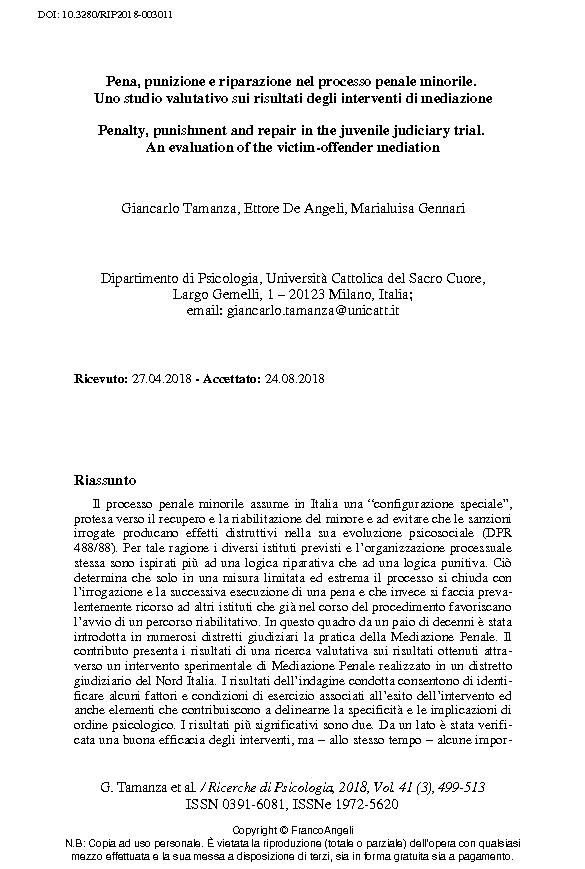Pena, punizione e riparazione nel processo penale minorile : uno studio valutativo sui risultati degli interventi di mediazione
499-513 p.
Il processo penale minorile assume in Italia una "configurazione speciale", protesa verso il recupero e la riabilitazione del minore e ad evitare che le sanzioni irrogate producano effetti distruttivi nella sua evoluzione psicosociale (DPR 488/88). Per tale ragione i diversi istituti previsti e l'organizzazione processuale stessa sono ispirati più ad una logica riparativa che ad una logica punitiva. Ciò determina che solo in una misura limitata ed estrema il processo si chiuda con l'irrogazione e la successiva esecuzione di una pena e che invece si faccia prevalentemente ricorso ad altri istituti che già nel corso del procedimento favoriscano l'avvio di un percorso riabilitativo. In questo quadro da un paio di decenni è stata introdotta in numerosi distretti giudiziari la pratica della Mediazione Penale. Il contributo presenta i risultati di una ricerca valutativa sui risultati ottenuti attraverso un intervento sperimentale di Mediazione Penale realizzato in un distretto giudiziario del Nord Italia.
I risultati dell'indagine condotta consentono di identificare alcuni fattori e condizioni di esercizio associati all'esito dell'intervento ed anche elementi che contribuiscono a delinearne la specificità e le implicazioni di ordine psicologico. I risultati più significativi sono due. Da un lato è stata verificata una buona efficacia degli interventi, ma - allo stesso tempo - alcune importanti criticità nella loro messa in opera. Al di là della quota molto limitata di situazioni che pur essendo state inviate dalla magistratura non hanno mai avuto accesso al servizio (nel 6.0% dei casi la vittima o l'autore del reato non si sono resi disponibili nemmeno per effettuare il colloquio informativo e preliminare) è stato rilevato che solo nel 57.1% dei casi avviati è stato possibile portare a compimento il percorso (cioè realizzare l'incontro diretto tra l'autore del reato e la persona offesa): in queste situazioni l'esito è stato positivo nel 78,5% dei casi.
Nel 42.9% dei casi, invece, l'intervento è stato interrotto dopo la fase preliminare (in cui la vittima e l'autore del reato sono stati incontrati individualmente). [Testo dell'editore].
The juvenile criminal trial assumes in Italy a "special configuration", aimed at the recovery and rehabilitation of the minor and to avoid that the sanctions imposed produce destructive effects in its psychosocial evolution (DRP 488/88). For this reason the various institutes foreseen and the organization of the trial itself are inspired more by a reparative logic than by a punitive logic. This determines that only in a limited and extreme measure the process closes with the imposition and subsequent execution of a sentence and that instead it is mainly made use of other institutions that already in the course of the procedure favor the start of a rehabilitation process. In this framework, for a couple of decades, the practice of Victim-Offender Mediation has been introduced in numerous judicial districts. The paper presents the results of an evaluation research on the results obtained through an experimental intervention of Victim-Offender Mediation carried out in a judicial district of Northern Italy.
The results of the research make it possible to identify some factors and conditions of exercise associated with the outcome of the intervention and also elements that contribute to delineating the specificity and the implications of a psychological nature. Two are the most significant results. On the one hand, the effectiveness of the interventions was verified, but - at the same time - some important problems in their implementation are found. Beyond the very limited amount of situations that despite being sent by the judiciary have never had access to the service (in 6.0% of cases the victim or the offender has not become available even to perform the informative and preliminary interview) was found that only in 57.1% of the cases initiated was it possible to complete the course (ie to carry out the direct meeting between the offender and the victim): in these situations the outcome was positive in 78.5% of cases.
In 42.9% of cases, however, the intervention was interrupted after the preliminary phase (in which the victim and the perpetrator were individually met). [Publishers' text].
Fa parte di
Ricerche di psicologia : 3, 2018-
Articoli dello stesso fascicolo (disponibili singolarmente)
-
Informazioni
Codice DOI: 10.3280/RIP2018-003011
ISSN: 1972-5620
PAROLE CHIAVE
- Giustizia riparativa, mediazione penale minorile, intervento clinico- sociale, ricerca valutativa
- Restorative justice, victim-offender mediation, socio-clinical intervention, evaluation research



